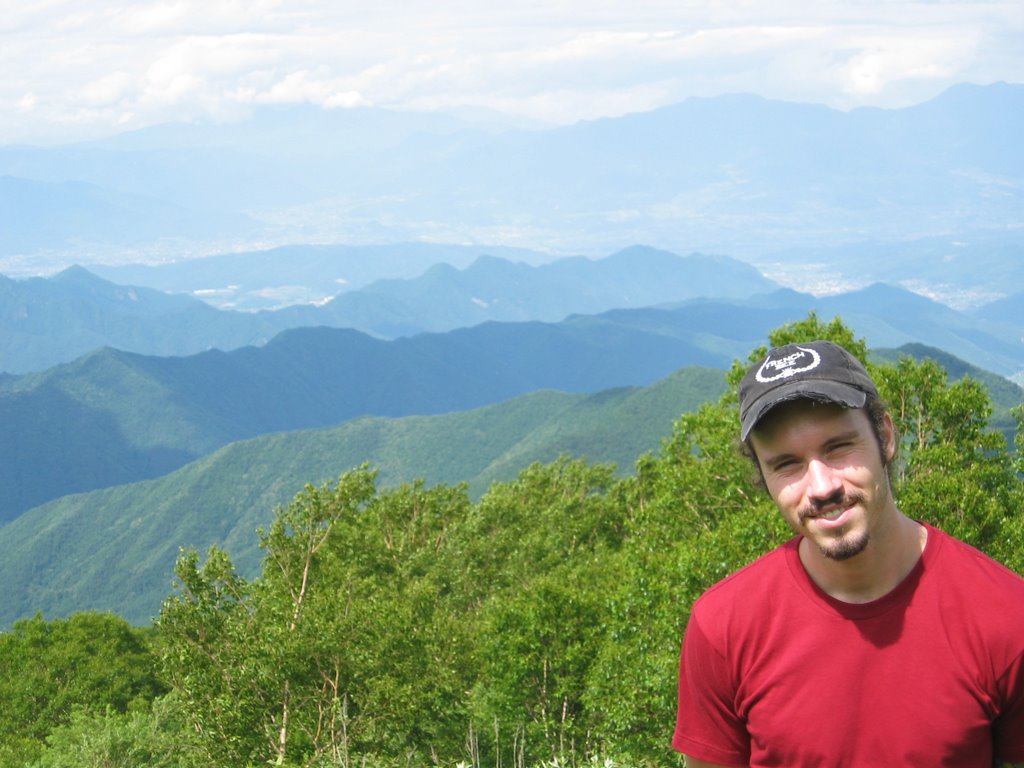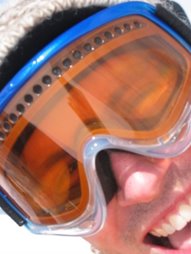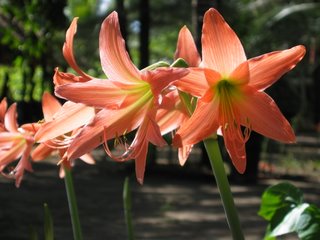 Before we went to Thailand, Colleen asked if she could organize the trip and deal with all of the nitty gritty details once we were in Thailand (buying bus/train tickets, getting us back on track after getting lost, finding places to stay, etc.) as a way of preparing for her trip to Central America in the fall. Knowing that her help would relieve me of all of those potentially frustrating travel duties and allow her to feel more comfortable setting off on a longer trip, I agreed to let her lead me around a foreign country like a helpless baby. I stepped in only when my failure to do so would have resulted in a wasted day or half day of travel. To Colleen’s disappointment, I intervened within a few hours of touching down in Bangkok after Col took us to a bus terminal with busses bound for Rayong as opposed to our preferred destination—Ranong.
Before we went to Thailand, Colleen asked if she could organize the trip and deal with all of the nitty gritty details once we were in Thailand (buying bus/train tickets, getting us back on track after getting lost, finding places to stay, etc.) as a way of preparing for her trip to Central America in the fall. Knowing that her help would relieve me of all of those potentially frustrating travel duties and allow her to feel more comfortable setting off on a longer trip, I agreed to let her lead me around a foreign country like a helpless baby. I stepped in only when my failure to do so would have resulted in a wasted day or half day of travel. To Colleen’s disappointment, I intervened within a few hours of touching down in Bangkok after Col took us to a bus terminal with busses bound for Rayong as opposed to our preferred destination—Ranong.We were standing before the ticket counter under the harsh glow of sometimes faintly flickering/sometimes glaring fluorescent lights and a dirty white placard that read ‘Rayong’ in red letters, three ticket cashiers were squawking at us with nothing but ticket commissions on their minds, the heat was twisting our patience taught in the heavy night air, and at the last moment I decided to look at the map to double check the spelling of the city name. Rayong is not Rangong. I got the name of the bus station we should have traveled to (one that sat across town, an hour away by taxi through Bangkok’s perpetually clogged commuter arteries) and we set off.
For $10, we each bought tickets for a nine-hour overnight bus ride to the port town of Ranong, a seafood mecca that gets its heartbeat and energy from the aquatic jewels of the Andaman Sea. Ranong is also home to a small, dusty pier from which a few boats leave daily to take visitors out to the quaint island of Koh Phayam, a destination recommended to us by two other JETs back in Japan. After a sunrise moped ride from Ranong’s bus terminal to the pier, Col and I walked into town to eat breakfast and fill the three hours before the boat departed with that wide-eyed, soak-everything-in silence that washes over any traveler who is plopped down in a completely foreign environment.
Stray dogs roamed the dirt streets that zigzagged out from the pier toward the center of town. All of the dogs seemed to have been painted with a sandy, brownish color and infected with a near constant itch. I never once saw a flea or other parasite on any of the dogs I saw in Thailand, but with coats full of dirt and sand in an environment that tries to melt away anything that is unfortunate enough to exist away from the water’s edge at midday, dogs always scratch themselves—it’s part of being a dog in Thailand.
As the sun timidly peaked over the horizon, women in large plastic boots with faces covered in dried white paste (used to make their skin smooth and protect their faces from the sun) started emerging from small shacks and ageing homes. When we reached the main drag in Ranong, people were bustling about, old pick-up trucks sagging from the weight of people cargo in their beds were whizzing up and down the road (nothing quite makes you feel like an outsider like 10 workers in the bed of a pick-up truck slowly turning in unison to stare at you—only blank, tired faces among them—as the truck passes), women with impossibly large buckets of flowers and food balanced atop their heads slowly walked down the sidewalk with a runway model’s precision and grace, and sidewalk restaurant owners primed their stoves and uncovered ingredients to prepare for breakfast customers.
We sat at a small restaurant, Col ordered and ate breakfast and tea for $1, and we walked around the corner to follow a steady stream of women and men wearing knee-high rain boots. Our noses alerted us of the early morning commerce before our eyes could: the scents of fish, standing pools of saltwater, dirt and dust, and cigarette smoke swirled and blended in the steamy morning air. At the end of a street lined with colorful mopeds and pick-up trucks was a massive fish market. I was amazed by what I saw before me: Piles of fish three and four feet high dotted the concrete platform like colorful growths on wet cement skin, buckets of baby Hammerhead sharks steamed under ice in the morning sun (I later learned these sharks were killed so their fins could be used to satisfy the Asian appetite for shark fin soup), dead eels sat coiled in neat rings with glazed eyes, lobsters lay in rows based on tail size, and all around me people were inspecting fish, haggling over prices, and loading trucks with massive quantities of seafood.
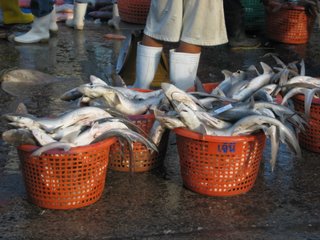 left: You like shark fin soup? If so, this is what you inspire.
left: You like shark fin soup? If so, this is what you inspire.There were so many infant fish (sharks being the most alarming for me) that were caught before they were mature enough to spawn that, just by the looks of it, the whole operation seemed far from sustainable. Even if this market was held once a week, the amount of seafood dragged from the depths to fuel it over the course of a year seemed too astronomical to go unnoticed by ocean-focused environmentalists. I just kept wondering, How long could this possibly go on? At what point will these fishermen be unable to find these mountains of fish in the sea because of their own overfishing?
 When we made our way back to the peer, pairs of other young travelers were sitting, chatting, and waiting for the ferry. All were tanned, all had backpacks, all looked tired and hot, most had European accents, and all smoked cigarettes as if each drag would help cool them down or miraculously help add weight to their airy, awkward, introductory conversations with each other about subjects that had clearly been discussed a thousand times on their trips already—“Oh, yeah, Ko Samui is way too touristy” or “Oh, yeah, I loved Ko Samui. Best party I’ve ever been too” or “If you want your basic open water cert the cheapest place to get it is…” or “The diving sucks there, but I had great dives at…” or “The Thai people always…” Anxious, they smoked and rolled cigarettes and smoked some more.
When we made our way back to the peer, pairs of other young travelers were sitting, chatting, and waiting for the ferry. All were tanned, all had backpacks, all looked tired and hot, most had European accents, and all smoked cigarettes as if each drag would help cool them down or miraculously help add weight to their airy, awkward, introductory conversations with each other about subjects that had clearly been discussed a thousand times on their trips already—“Oh, yeah, Ko Samui is way too touristy” or “Oh, yeah, I loved Ko Samui. Best party I’ve ever been too” or “If you want your basic open water cert the cheapest place to get it is…” or “The diving sucks there, but I had great dives at…” or “The Thai people always…” Anxious, they smoked and rolled cigarettes and smoked some more.A man emerged from a new, silver pick-up truck to greet us. The top three buttons of his shirt were unbuttoned, revealing a hairless, tanned chest and a few gold chains that were flamboyantly out of place amidst the dust, the shacks, the dogs, and the people milling about in worn clothes and flip flops. In that Thai-English haggler’s dialect that sounds alarms in the ears of all white people that visit Thailand, the man approached Colleen and I and demanded, “Hey friend, where you going today?”
We told him.
“Oh that’s nice place. You want to eat or drink or party at my bungalows some night on other side of the island, you call me. You need anything, you call me.” He scribbled his name and number on the back of a business card and handed it to me. His name read Mr. Pot. He smiled and approached a couple of other travelers.
The ferry arrived and took us past tired fishing docks and retired boats out through the open sea that surrounded the island. When we stepped foot on the island’s pier, the recruits were waiting.
“Hey where you staying? You want bungalows?”
“Hey mister, free taxi, you come to Coconuts?”
“Real cheap place, ocean views. Come with me!”
Luckily, we didn’t have to appear vulnerable and flip through our guidebook and try to haggle over a price out on the pier because we already knew we wanted to follow our friends’ recommendations and stay at a place called Bamboo Bungalows. We easily found the Bamboo Bungalows representative and she shuffled us over to two mopeds. We each hopped on the back of one and held on for dear life with heavy backpacks strapped to our backs as the mopeds sped away from the pier. (There are no roads on the island so we sped over tiny sidewalks that allow seasoned moped driver’s to reach speeds that easily scare the shit out of anyone unaccustomed to being on the back of a fast-moving moped.)
 left: One of the main intersections on Koh Phayam. The building on the left is a store that sells mangoes, cashews, sarongs, and pineapples.
left: One of the main intersections on Koh Phayam. The building on the left is a store that sells mangoes, cashews, sarongs, and pineapples.Koh Phayam is largely undeveloped with only small clusters of development surrounding the island’s few sand beaches. Most of the island is covered with groves of cashew and coconut trees. The cashew trees were loaded with yellow pear-shaped fruit. One bulbous cashew casing sticks out of the end of each fruit, and it is this casing and the softness of the nut inside that make cashews a difficult nut to prepare for market (casings must be individually split, nuts must cleaned, dried in the sun). The branches of the cashew trees hang over the moped sidewalks and litter them with rotting fruit that squishes under the thin moped tires. A few houses stood perched atop pilings amidst the wilderness. Families lounged in the shade underneath the houses as children played on the ground and adults lay in hammocks. War news would have trouble taking hold here, I thought as we drove up and over small hills; the warm island air pulled at the curls in my hair and made my driver’s black, straight hair flap in my face.
 left: The trail that leads through the Bamboo Bungalows compound.
left: The trail that leads through the Bamboo Bungalows compound.Bamboo Bungalows is a beautiful little place at the water’s edge on the island’s eastern shore. It is surrounded by a few other bungalow places and bars on the beach, and most of its bungalows come with views of the sea. Hammocks swing in the breeze in random locations around the property because…well…because there’s no bad place for a hammock by the beach. There is a large, tiled outdoor cabana that draws customers from other bungalow resorts (each resort has its own cabana as well) for breakfast, lunch, and dinner. There are a few kayaks and mopeds available for rent. A woman with wide, dark eyes and a brisk duck footed walk named Gail plays the role of manager and her five-year old son could occasionally be seen lounging like a lizard under the afternoon sun or pouncing on the laps of a few of Bamboo’s “long term guests,” the ones who basically live there for extended periods of each year by constantly extending their tourist visas.
 left: Our bungalow
left: Our bungalowWhen we arrived, a young girl approached us and showed us around the property to look at bungalows. We took one a few yards from the sand for $10 a night. The bungalow had a porch with two addictively comfortable chairs, a nice bed with a mosquito net, a bathroom with a rain-fed shower and sink, and an overhead light that was only operable from 6:00-11:00 p.m. The girl gave us the key and walked away and we had a few moments of pure bliss: We felt as if we had found paradise for $10 a night and, for the next two weeks, we had nothing to do but wallow in it. It was worth flying to Thailand for those few brief moments, moments so caramelized in happiness and concentration on both the present setting and the enjoyment waiting in the wings of the future that no sharp thought or memory of work, tears, life, death could pierce them. I did what anyone feeling complete joy in a beachside bungalow would do: I put on my bathing suit and ran at full speed down to the ocean as if it would vanish into thin air at any moment.
 left: The view from the porch of our bungalow
left: The view from the porch of our bungalowFor a week we ate excellent curry dishes, drank fruit shakes a few times a day, and devoted significant chunks of our time to swimming, bodysurfing, reading, and walking on the beach. I have never felt more relaxed in my life. Never. I reached a new high low. At one point in the week, I said to Colleen, “I now know that it takes approximately 4 days of reading, eating good food, and participating in little activity for me to completely unwind and shed every shred of stress that builds up from sticking with the daily grind.” I reached a point of constant relaxation where I woke up early but calm and at peace, I walked slower (if and when I needed to walk anywhere at all), I felt no shame in nodding off into Nap Land while reading on the porch or beach in the middle of the morning or afternoon, and I felt incubated in a calm and pleasant aura that seemed as if it would never dissipate.
 left: Feet and anchor
left: Feet and anchorNow, I know that this state of relaxation is impossible for one to maintain if any sort of challenging job and/or bustling community/family life is thrown into the mix, and I think that’s OK. I wouldn’t want to lead a catatonic existence on the porch of a beach bungalow for the rest of my life (although many expats—usually older, single males it seems—do move to tropical developing countries, turn their pasty hides dangerously dark from lounging in the sun, and finish out their days like modern, suspiciously inactive conquistadors); without activity for more than a week, everything about my being atrophies and I feel like a slug.
A shirtless 20 year-old Thai man named Alif approached us when we sat to have our first meal. He is short, tanned, and appears naturally muscular. A self-professed lover of women, Alif is a smooth talker with a bright, wide smile and a name that, according to him, “no woman forgets.” Despite his attitude toward women, one that at first appeared innocently jouvenile but slowly started reeking of chauvenism as the week progressed, Alif possessed a level of maturity that seemed at odds with the smooth skin of his youthful face and I was quickly tempted to ask him how old he was after we started talking. Alif asked us about Japan after learning we were JETs and explained that he once worked with a few Japanese people in Ranong. He had fond memories of his time spent with his Japanese co-workers and remarked that Japanese people were polite and kind. He said that he enjoyed working at Bamboo Bungalows because the place had an older clientele and he thinks older people are more interesting to talk to than younger people. He has a 26 year-old girlfriend who lives in Germany whom he met at Bamboo Bungalows last year. Throughout our stay, Alif frequently joined our conversations and sat down at random tables during meals to talk with guests. I never could quite figure out his role at Bamboo Bungalows, but I think he was there to converse with the guests and help take a food order or two for the kitchen every once in a blue moon. When I asked him if he liked working at Bamboo Bungalows (a question that answered itself as I was asking it—I basically asked, Do you like eating good food, talking to interesting people from around the world, and taking two hour naps in a hammock wrapped in ocean breezes every afternoon?—he smiled and said, “Oh yeah! It’s much easier than fishing!”
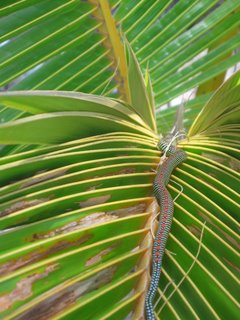 left: Snake in palm
left: Snake in palmAs the week unfolded, we met different guests at Bamboo Bungalows and settled in. The first time I saw Tim, a tanned athletic man in his early 40s who usually roams the compound shirtless, he was kayak surfing the small, glassy waves in front of Bamboo at sunrise. His kayak, he later explained, was purchased on the east coast of the U.S. and dragged out to Thailand because it was hard for him to find a sleek surf kayak in a third world country (understandable!). He spends six months out of the year in Thailand and has spent “the last four seasons” at Bamboo Bungalows (a season for Tim lasts six months). How he made/makes a living back in his home country of Canada remains a mystery although he made one comment during our stay about eagerly awaiting the 15th of the month because a large of amount of money was going to be wired to his bank account. In places like Thailand, you don’t ask well-tanned, middle-aged expats what they do/did back home because, chances are, they don’t want to talk about life back home and everything they ran from.
 left: Soccer goalie on the beach
left: Soccer goalie on the beachWhen I asked Tim why he keeps coming back to Bamboo as opposed to other places, why he dragged his kayak across the world to this specific beach, why he continually makes day long “visa runs” over to Burma so he can keep living in a foreign country on a tourist visa despite all of the ethical issues associated with a visitor living as a resident incognito (not paying taxes, only choosing to revel in a country’s perks while turning a cold shoulder to its problems, etc.) he said, “Man, this place is special. I’ve traveled all over the world. I’ve lived in Honduras, done South America (I find this expression very interesting and many travelers use it—“I’ve done Europe”—like a continent or country is something that can be completely understood or explored in a month or a year. Done deal, country mastered, next country please. Silly.), spent a few years traveling Africa, and I’ve rarely seen places like Bamboo Bungalows and Koh Phayam. Where else can you leave $10,000 worth of photo equipment in your unlocked bungalow and not worry about it? Security is not an issue here, and that’s a rare thing to find these days. I can ride the kayak each day, the food’s great, it’s cheap. For me, it’s paradise.” He’s lived all over the world, survived in places that would scare the shit out of most people, and cut through endless amounts of red tape at countless border crossings. Tim seemed like a nice guy you’d never want to cross.
We met Ian, a professional photographer who lived in Cambodia for six years in the late 1990s. He currently is making a living from doing candid children’s photography in which he shoots pictures of kids in their natural environments instead of within the confines of a studio. His mini-portfolio that he travels with was inspiring and beautiful. It’s filled with unique images of children hanging from trees, hiding in forts, and jumping on trampolines. He also carries shots from his travels and has a knack for portraiture. I got lost in the lines and wrinkles captured in his pictures of old Cambodian women and felt, even if only for a split second, like I could understand the labor that filled their pasts. His pictures reveal the lives of his subjects and have earned him various photo prizes and cover spots on Cambodian magazines and newspapers.
 left: Boulder on the beach
left: Boulder on the beachHe was at Bamboo on vacation and was about to head back over to Cambodia to shoot for a project he’s working on that attempts to capture images of various aspects of Cambodian culture that are disappearing as Westernization and tourism change Cambodia. One of his main subjects that he’s been working with is rural boxing. There are many boxing rings and training centers out in the countryside of northern Cambodia that are slowly dying off. With photos, he documenting the extinction.
When Ian lived in Cambodia, the country was a lawless place in which “everything was both possible and impossible at the same time.” Out in the market behind his house during his stay in Cambodia, he could have, if he wanted to, purchased hand grenades for $5, AK-47s for $10, and kilos of pot for a few bucks (I never did find out how frequently, if at all, he spent a few bucks at that market. Somethings are best left to the imagination). For the most part, his experiences in Cambodia were positive and he was never once harmed or threatened by the bandits that are known to roam Cambodia’s dusty roads and demand tolls from drivers. He has been to Angkor Wat “about 30 times.” His advice to Colleen after learning that she wanted to go to Cambodia to shoot this summer: “Stay off the backpacker circuit. Go out into the villages, hire a moped guide for the day to take you to the places foreigners don’t visit, do a home stay. Just get off the fucking backpacker trail. Get off it.”
We met Michelle, a German man with a warm smile and a love for Bamboo’s banana fritters—fried pieces of battered banana served with sweet milk. Michelle has made four or five trips out to Thailand in the past and has ended up staying at Bamboo longer than planned each time. This year, he spent his entire five-week vacation (people in Europe are sensible enough to realize that 5-10 vacation days a year—the American average—is a fucking farce, one that reveals Corporate America’s true feelings about employee welfare and status) at Bamboo. After some prodding, he reluctantly agreed to talk briefly about his job in Germany and said he worked in a court office. His girlfriend has a daughter back in Germany and he wants to take both of them to Bamboo for next year’s five-week getaway. Michelle was genuine and extremely kind to us during our stay in Koh Phayam. He’s the type of guy anyone would be lucky to have as a long-time friend.
 left: Minnow Pipeline
left: Minnow PipelineI loved how Michelle used the expressions “This is shit” or “This is really nice” in conversation. He would say things like, “After Germans started using the Euro, shopkeepers raised their prices even though the Euro was not that strong compared to our old currency. This is shit man. This is reeeally shit.” Or “Every time I come to Thailand in the past, I always think, ‘Man, I’m going to stay at Bamboo for one week, maybe two.’ But I always stay longer. This time I stayed for the whole five weeks. This is reeally nice, man.”
We met Babet, a young doctor in her late twenties from Switzerland. She had just finished up a year of working at a refugee camp in northern Thailand near the Golden Triangle. The camp had 40,000 tents (one family/couple per tent) and faced a staggering number of medical cases a day. Malaria, Dengue Fever, and Typhoid raged through the camp population like fire through dried wheat fields and Babet spent most of her timing consoling and helping the sick. Deaths were commonplace and were seen as something that could be slightly managed rather than prevented. She miraculously avoided infection during her stay at the camp. Her future plans: return to Switzerland, visit family, and return to either the same refugee camp or another camp in a different developing country.
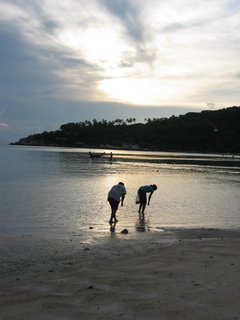 left: Clam collecting
left: Clam collectingEvery morning, Babet would spend about an hour doing yoga and exercises on the beach. She ate lite meals at the Bamboo cabana and jogged down the beach often. Despite her healthy eating and exercise habits, she, like most Europeans we met in Thailand, smoked cigarettes regularly.
 below: Longtail boats in the bay. All fishermen on Koh Tao use these boats to fish.
below: Longtail boats in the bay. All fishermen on Koh Tao use these boats to fish.After a week, we left Koh Phayam, took a midnight ferry over to an island called Koh Tao, and haggled our way through a horde of moped taxi driver’s to a hotel called Tropicana. The hotel was wedged in between other hotels and bungalow places on one of the island’s bays. When we dropped our bags and sat down on the bed in the hotel room, we wished that we had stayed at Bamboo. Koh Tao was overdeveloped and filled with internet cafes, dive centers, bungalow places, bars, and money exchange counters. It was another beautiful island thrown to the backpacking wolves. We tried to avoid all of the places that were swarming with backpackers (mainly the bars with drink specials and Christmas lights and the main road in front of the ferry dock, the one lined with Western restaurants and bars) and spent most of our time in and around our hotel.
 left: Sandbar at low tide. Bungalows on the hills in the background.
left: Sandbar at low tide. Bungalows on the hills in the background.I did two boat dives and saw some spectacular soft and hard coral. The water was warm and clear, although the fish were very similar to the ones I saw off the coasts of Australia and Hawaii. We went snorkeling and Colleen braved the deep water and overcame her fear of sharks for a few hours to swim out around a rocky point on the edge of one of the bays.
We left Koh Tao, took an overnight bus to Bangkok, and spent the day in Bangkok before our flight. When we arrived at Khao San Rd., one of Bangkok’s shopping districts, at 5:30 a.m., prostitutes were already anchored to their johns—young backpackers who looked broke and scruffy. I was shocked to see the prostitutes showing an interest in young backpackers as I thought that surely they would want to focus their energies on older men with money to spend, men that go to Thailand specifically for its sex industry. If, however, a girl only asked $10-20 for her services, I guess a large spectrum of men could foot the bill.
As we walked down the dark, narrow streets in the thick night air, girls walked arm and arm with drunken young backpackers and laughed like they thought the mens’ jokes were funny. Col and I were hungry so we sat down at a restaurant/bar that was open 24 hours. There was a large crowd of prostitutes and Western backpackers still drinking at 6:00 a.m. and we watched the debauchery as we waited for our food. Some of the men were so drunk they didn’t realize when their sober prostitutes refilled their glasses (the girls sipped from one or two glasses of beer all night as the men drank, as packs of men often drink, as if they had something to prove, taking huge gulps of beer). It was amazing watching laughing, red-faced young men carry on conversations as focused prostitutes kept their glasses filled with beer. I couldn’t help but wonder if some of these drunk backpackers had any vague idea of the events that awaited them in their near futures (mainly—have sex, pass out, and get robbed by the kind girls that had just been ordering them drinks all night). I watched silently as a few men stumbled off with girls, swallowed up by the humid darkness beyond the reach of the restaurant’s lights with barely a burp echoing off of the closed storefront gates.
The rest of the day played out as follows: followed an expat freelance writer’s suggestion and went to an amazing outdoor flower and food market, went to a temple called Wat Pho, met a man who said he was bus driver and who gave us some “advice” on sights to see in Bangkok, later found ourselves in a bodega jewelry store filled with dusty jewelry and surrounded by 10 women trying to pressure us to buy jewelry (we later found out this is a common scam in Bangkok: taxi drivers sweet talk foreigners into visiting jewelery stores and the taxi drivers get kickbacks by way of free gas or commissions from the stores), went back to Wat Pho and saw the gold reclining Buddha and his stunning feet made with the most intricate Mother of Pearl inlays I’ve ever seen, went back to Khao San Rd., had lunch and shooed away all of the heckling street performers and salesmen that tried to sell lighters and stuffed animals to us while we ate, walked down Khao San Rd. amidst hundreds of backpackers and looked at all of the knock-off clothing and backpacks, walked past eight or nine backpackers getting their hair braided into dreadlocks on the side of the road by Thai people with hair braiding stalls, and stopped to have a drink.
When we sat down at an outside table at the bar, I met an interesting man from Belgium named Steffan. Steffan has lived in Khao Lak, Thailand for the past year to help rebuild buildings that were destroyed in the tsunami. In Belgium, he taught classes on basic construction principles to students who had no background in construction but an interest in the field. He was living in Khao Lak and paying rent on a small apartment, paying for his own food, and travel expenses with no financial support from his volunteer organization. He had originally planned to stay two weeks, ended up staying a year, and now feels as though he could never go back to paying construction gigs in Belgium. He wants to volunteer as long as places exist in the world that could use his services (basically, until he dies). Volunteering in Thailand has changed the way he views money and success. I felt inspired after talking to him and felt excited about the volunteer opportunities I will seek out when I travel around the world after I leave Japan.
We caught an airport shuttle bus back to the airport and had a horrendous nine-hour delay on our flight back to Japan. I won’t go into the details, but the delay was the result of our ill-chosen airline’s incompetence. A warning to all travelers: DO NOT FLY AIR INDIA—EVER! In talking with other passengers who frequently fly to and from India, we learned that 10-24 hour delays are not uncommon when flying Air India. The plane was falling apart (a leaking toilet and flooded cabin aisle were the initial causes of our delay), the flight crew failed to complete safety checks and demonstrations (passengers closed their overhead compartments as the plane was rolling around the runway), and the management literally ran away from angry customers at Narita Airport.
AGAIN, IF YOU WANT TO FLY SAFELY AND AVOID DEALING WITH A SORRY SHELL OF A COMPANY— DO NOT FLY AIR INDIA!
